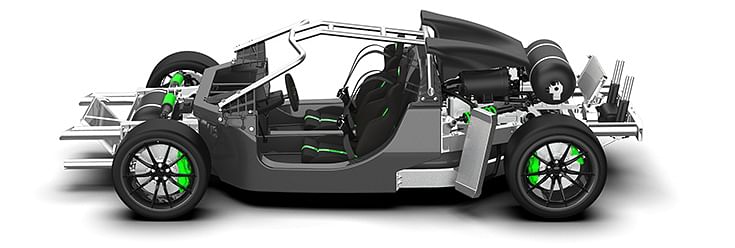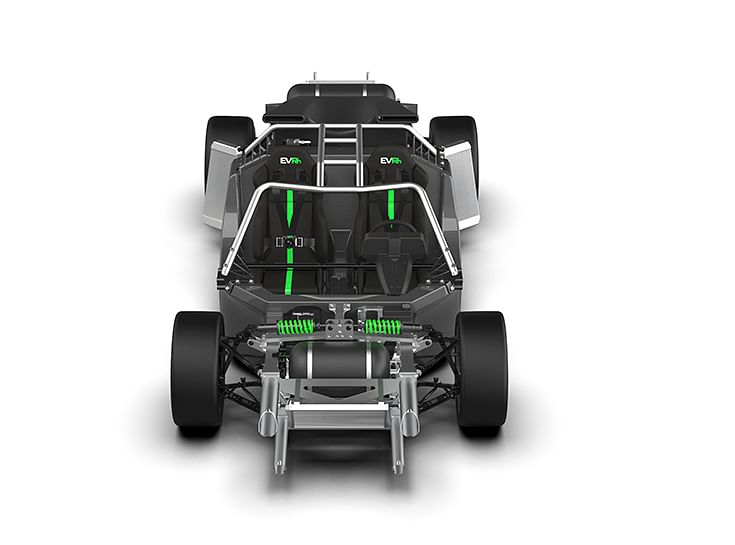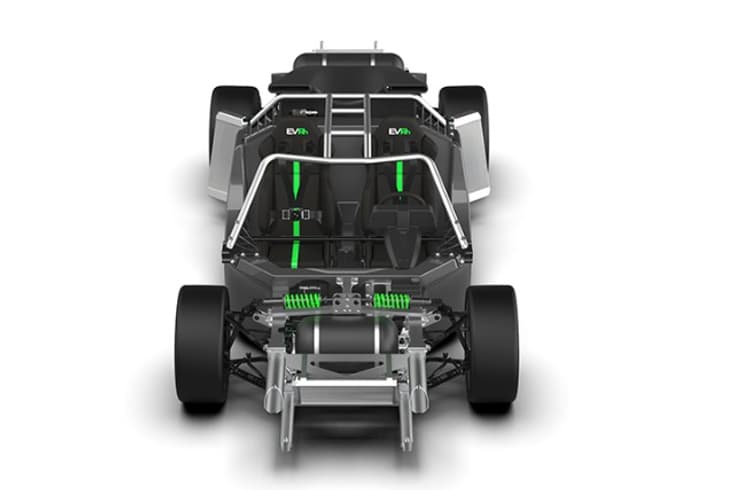WAE Technologies reveals high-performance hydrogen FCEV platform
With an industry-leading Fuel Cell Electric Vehicle (FCEV) battery pack at its core, EVRh capable of discharging 430kW of power and having a 120kW charge power; enables sub-2.5sec 0-100kph acceleration with a vehicle mass less than 1,900kg, with a range of 600km.
WAE Technologies (WAE) has revealed its latest hydrogen fuel cell electric vehicle innovation, at this year’s CENEX Low Carbon Vehicle (LCV) Show.
The ultra-high performance hydrogen fuel cell electric vehicle platform - EVRh – has been developed to demonstrate the potential of hydrogen- (H2) powered powertrain systems through implementation in a high-performance vehicle application.
Produced by WAE in Oxfordshire, EVRh combines WAE’s extensive vehicle and powertrain engineering experience alongside a cutting-edge H2 fuel cell system, in one innovative package, allowing for end users to have zero tailpipe emissions driving.
EVRh utilises an H2 fuel cell system, to produce electricity through a chemical reaction between hydrogen and oxygen in a fuel cell stack. Working with partners for the H2 fuel cell system, paired with WAE’s systems integration and electrification technology, EVRh determines the potential of hydrogen powered performance systems, as a parallel-hybrid derivative of its EVR rolling chassis concept.

Featuring a lightweight composite structure, the high-performance H2 fuel tank and battery system are situated in the middle of the vehicle, optimising centre of gravity. The platform’s design flexibility enables manufacturers to create multiple configurations from track-only vehicle, where power-to-weight is maximised, to roadgoing models of both open-roof Targa and fixed-roof GT style. This is made possible by the architecture’s central tub which has been designed from day one to allow for such flexibility – including open roof design – while still featuring the very latest performance technology such as active aerodynamics.
The powertrain has a state-of-art liquid-cooled FCEV battery pack at its core, EVRh is capable of discharging 430kW of power and having a 120kW charge power, enabling sub-2.5sec 0-100km/h acceleration and an estimated lap time of the Nürburgring in under 7 minutes 20 seconds. All-wheel drive and rear-wheel drive layouts are supported through multiple e-motor configurations.

As per WAE, the hydrogen hybrid powertrain also brings multiple benefits to manufacturers, enabling an accelerated route to market, with the entire engineering and assembly completed by WAE, significantly reducing time and cost from development to market launch.
Similarly, both OEMs and Tier 1s have the chance to incorporate new products into the powertrain using EVRh, since the rolling chassis can undergo continuous enhancements by leveraging WAE's latest motor and battery technologies.
Paul McNamara, Technical Director for WAE Technologies, said: "Since its inception in 2010, WAE has been dedicated to innovating cutting-edge and transformative technologies across a variety of applications and industries. EVRh, on display at CENEX LCV for the first time, is another key example of WAE’s capabilities in the development of solutions for zero carbon vehicles, enabling state-of-the-art FCEV vehicles to be brought to market rapidly and cost-effectively.”
RELATED ARTICLES
Autoliv Plans JV for Advanced Safety Electronics With China’s HSAE
The new joint venture, which is to be located strategically near Shanghai and close to several existing Autoliv sites in...
JLR to Restart Production Over a Month After September Hacking
Manufacturing operations at the Tata Group-owned British luxury car and SUV manufacturer were shut down following a cybe...
BYD UK Sales Jump 880% in September to 11,271 units
Sales record sets the UK apart as the largest international market for BYD outside of China for the first time. The Seal...






 By Autocar Professional Bureau
By Autocar Professional Bureau
 06 Sep 2023
06 Sep 2023
 4782 Views
4782 Views


















 Ajit Dalvi
Ajit Dalvi




